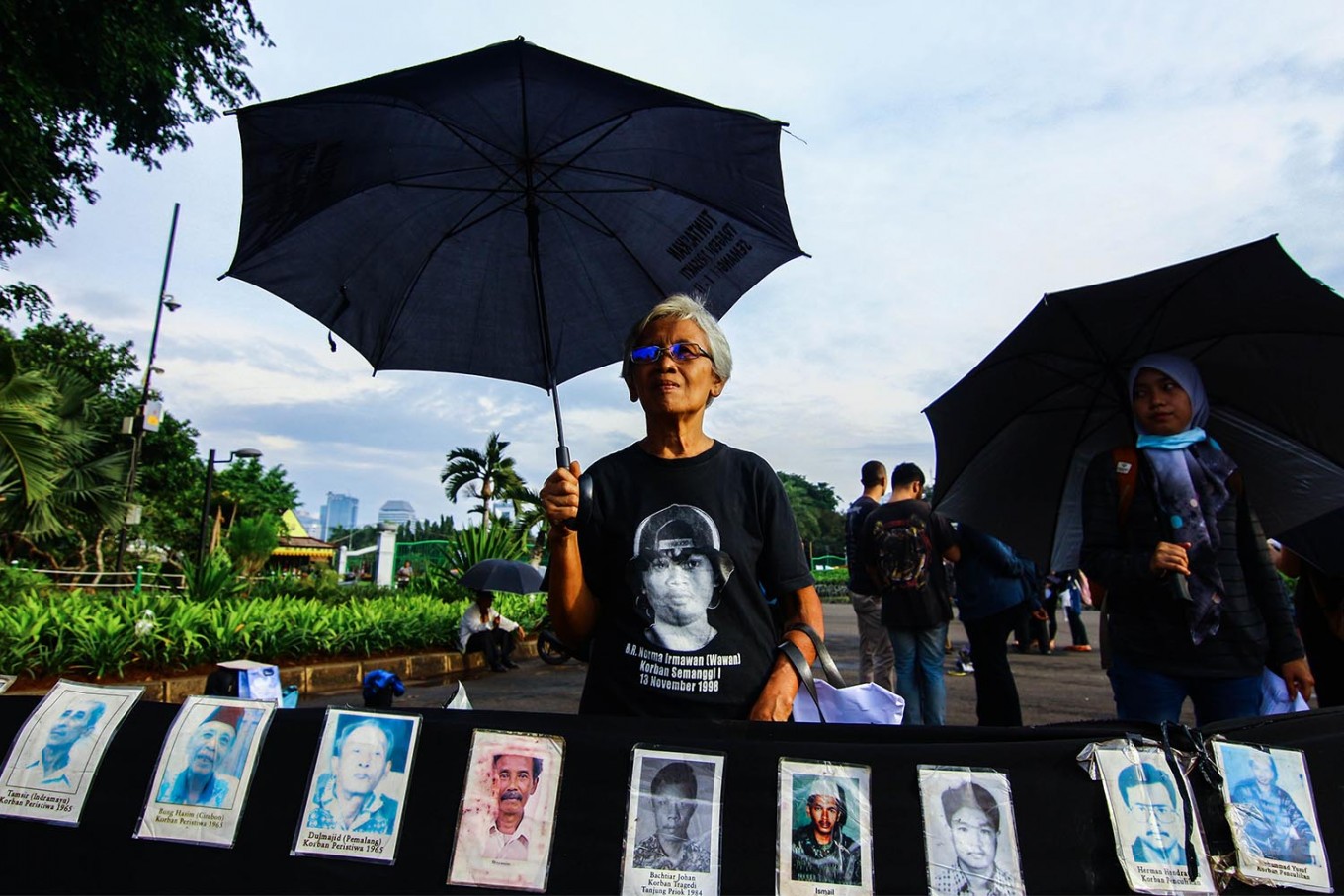Popular Reads
Top Results
Can't find what you're looking for?
View all search resultsPopular Reads
Top Results
Can't find what you're looking for?
View all search resultsCasting a vote for human rights in 2019
Whether we decide to vote or not, we should be bracing for more assaults on freedom and justice.
Change text size
Gift Premium Articles
to Anyone
 Maria Catarina Sumarsih holds an umbrella during the 536th kamisan, a weekly silent protest in front of the State Palace in Jakarta, on Thursday, April 26. 2018. The protests have been held since 2007 to urge the government to resolve human rights abuse cases, including the 1998 Semanggi shooting, which resulted in the death of Maria’s son, Bernardus Realino Norma Irawan. (JP/Aditya Bhagas)
Maria Catarina Sumarsih holds an umbrella during the 536th kamisan, a weekly silent protest in front of the State Palace in Jakarta, on Thursday, April 26. 2018. The protests have been held since 2007 to urge the government to resolve human rights abuse cases, including the 1998 Semanggi shooting, which resulted in the death of Maria’s son, Bernardus Realino Norma Irawan. (JP/Aditya Bhagas)
T
he upcoming presidential election is looking bleak for the human rights camp. After the two presidential candidates announced their running mates last month, it became clear that none of the candidates will prioritize, let alone defend rights for all Indonesians. Which leaves those who deeply care about freedom and justice with a tough decision when the time to cast their ballot comes. Who to vote for, if we decide to vote at all?
Let’s weigh in our options.
In the 2014 election, the now-incumbent President Joko “Jokowi” Widodo was the clear choice for human rights advocates for two reasons. First, he was branded as a clean politician, a fresh face in Indonesian politics who could bring progress for the country. Second, rights advocate would die before they vote for Jokowi’s opponent at the time, Prabowo Subianto, a New Order ex-general with a questionable human rights track record.
Jokowi did not have a strong human rights stance in his previous campaign nor did he make a meaningful stride to resolve past rights abuses or improve rights commitment during his presidency. He showed small gestures such as making a statement in defense of the rights of the LGBT community, loosening journalist access restriction to Papua, and hosting a meeting with victims of past rights abuses. None of these translated into meaningful actions to improve human rights in the country, but at the very least, it showed his intention of not making it worse.
That is until Jokowi shocked his progressive base by announcing Ma’ruf Amin as his running mate. As the chairman of the Indonesian Ulema Council (MUI), Ma’ruf played a role in advocating many discriminatory policies. He played a key role in lobbying for the “religious harmony” regulation which led to restrictions of religious freedom for minorities. Under his leadership, MUI issued fatwas declaring Ahmadi Muslims as deviant, which led to the government banning the Ahmadi Muslims from proselytization apart from calling for the criminalization of homosexual activities. He contributed to putting former Jakarta Governor Basuki “Ahok” Purnama, a Chinese-descent Christian, in jail after issuing a declaration that Ahok conducted blasphemy against Islam.
Many of Jokowi’s supporters interpret his picking Ma’ruf as a political strategy to secure conservative Muslim voters to ensure his re-election. Others are more skeptical, as it signals Jokowi’s unwillingness to spend his political capital on the human rights cause.
Prabowo, on the other hand, decided to give his presidential candidacy another try. He is still trying to convince the populace that his military strongman brand will make Indonesia better. The son-in-law of former autocratic president Soeharto, he was dishonorably discharged for his involvement in the abduction and torture of pro-democracy activists in 1998. He was also accused of ordering the mass killing of hundreds of East Timorese in the 1980s. For human rights groups, Prabowo is a clear threat to democracy and the rule of law.
His running mate is Sandiaga Uno, a businessman and former deputy to Jakarta Governor Anies Baswedan. It is still fresh in our minds how they ran on a racialist agenda, swaying voters to choose a leader based on religion and ethnicity.
Both Prabowo and Sandiaga’s track records should be warning signs of what could happen if they were elected to the most powerful office in the country.
So what should human rights advocates do come election 2019?
Whether we decide to vote or not, we should be bracing for more assaults on freedom and justice. The issue of human rights in Indonesia has always been treated like the “step kid” compared to other issues such as the economy, jobs, welfare, and infrastructure development, among others. Today, it has become more like a “plague” that each candidate avoids for fear of either losing voters or losing face.
Clearly we cannot rely on the government to fight for our rights. Therefore, civil society needs to consolidate and step up their game, by getting more involved in direct advocacy. In addition to keeping up the work at the grassroots level, activists should allocate more resources in lobbying for pro-human rights legislation, preventing anti-rights bills from being passed, and overturning anti-rights laws. Rights groups should send a message that whoever becomes Indonesia’s next president, should be aware that resistance against discriminatory and abusive policies will continue to grow.
***
The writer is an advocate for human rights and social justice. A Fulbright awardee at New York University, she co-produces and co-hosts a podcast that talks about identity and politics in Indonesia called “KentangPanas”.








